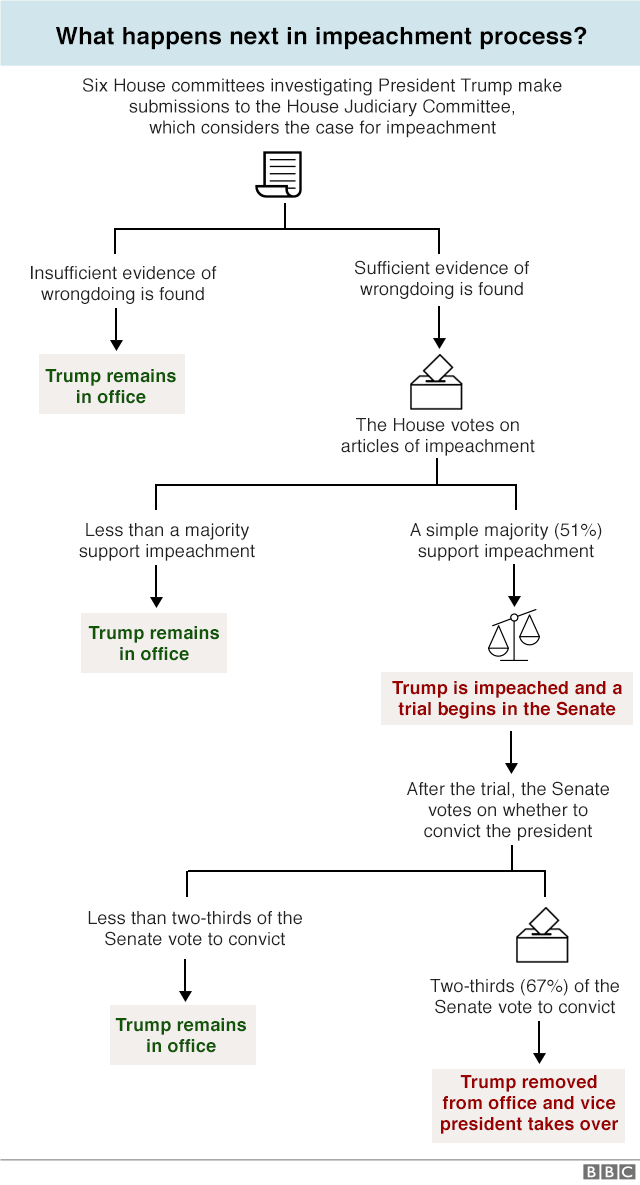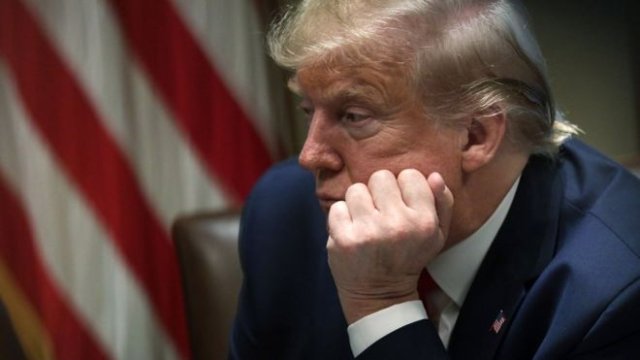Evidence for impeaching US President Donald Trump for misconduct in office is "overwhelming", according to the panel leading the impeachment inquiry.
The president placed personal political interests "above the national interests of the United States", it states in a key report to House lawmakers.
He did so by trying to "solicit foreign interference" from Ukraine to help his 2020 re-election bid, it says.
The report is designed to lay out the case to remove Mr Trump from office.
He denies any wrongdoing, and has described the inquiry as a witch-hunt.
READ ALSO: Trump 'will not participate in impeachment hearing,' says White House
Before the draft report was released, the Republican president attacked the Democrat-led investigation as "very unpatriotic".
Following publication, White House press secretary Stephanie Grisham said the Democrats "utterly failed to produce any evidence of wrongdoing" and that the report "reflects nothing more than their frustrations".
The report now goes to the House Judiciary Committee, which will begin proceedings on Wednesday and consider formal impeachment charges against Mr Trump.
What does the report say?
The Trump-Ukraine Impeachment Inquiry Report was made public on Tuesday by the House Permanent Select Committee on Intelligence.
It says the inquiry "uncovered a months-long effort by President Trump to use the powers of his office to solicit foreign interference on his behalf in the 2020 election".
"President Trump's scheme subverted US foreign policy toward Ukraine and undermined our national security in favour of two politically-motivated investigations that would help his presidential re-election campaign," it says.
"The president demanded that the newly-elected Ukrainian President, Volodymyr Zelensky, publicly announce investigations into a political rival that he apparently feared the most, former Vice-President Joe Biden, and into a discredited theory that it was Ukraine, not Russia, that interfered in the 2016 presidential election."
Evidence of misconduct is overwhelming "and so too is the evidence of his obstruction of Congress", the report says.
Anyone who listened to Adam Schiff's extended, extemporaneous closing statement at the impeachment hearings two weeks ago probably wouldn't be surprised by the summary of the Intelligence Committee report released on Tuesday. Buried within the pages of the 300-page document, however, were some striking new details.
 The telecommunications company AT&T provided committee investigators with Rudy Giuliani's mobile phone records - and those records shed new light on the timing and breadth the communications Donald Trump's personal lawyer had with the White House.
Starting in April of this year, Giuliani had multiple phone conversations with numbers listed for the White House and, in particular, the Office of Management and Budget - the government agency ultimately responsible for putting a hold on the congressionally authorised US military aid to Ukraine.
While the details of these communications aren't known, their simple existence undercuts the contention of some presidential defenders that Giuliani was operating independently of senior administration officials.
Multiple witnesses, including US Ambassador to the EU Gordan Sondland, have testified that Giuliani was directing them, at the behest of the president, to pressure Ukrainian officials to open investigations that would be politically advantageous for Mr Trump.
Now the line between Giuliani and the White House has become more certain.
What happens next?
The intelligence committee voted 13 to 9, along party lines, to approve the report and send it to the House Judiciary Committee.
The judiciary panel's hearings will begin with four constitutional scholars, who will explain how impeachment works. The White House has refused to participate in the hearings, citing a lack of "fairness".
Among formal impeachment charges expected to be considered are abuse of power, obstruction of justice and contempt of Congress.
Democrats are keen to hold a vote on impeachment in the House of Representatives before the end of the year, with the prospect of a trial in the Senate perhaps as early as January.
What are Republicans saying?
Before the draft report was made public, House Republicans released their own 123-page report that condemned the "unelected bureaucrats" who testified, saying they "fundamentally disagreed with President Trump's style, world view and decisions".
The document accuses Democrats of "trying to undo the will of the American people" and argues that they have been trying to depose the president since his first day in office.
"None of the Democrats' witnesses testified to having evidence of bribery, extortion, or any high crime or misdemeanours," it argues, in reference to the constitutional clause that permits the removal of a president.
House Intelligence Committee Chairman Adam Schiff dismissed the Republican rebuttal, saying it was "intended for an audience of one", Mr Trump, and "ignores voluminous evidence "against him.
In London, where he is attending the 70th anniversary of defence alliance Nato, Mr Trump slammed Mr Schiff by name, calling him "a maniac", "a very sick man" and "a deranged human being".
What is Trump accused of?
Democrats say Mr Trump dangled two bargaining chips to Ukraine - $400m (£309m) of military aid that had already been allocated by Congress, and a White House meeting for Mr Zelensky - to obtain the investigations. They think this political pressure on a vulnerable US ally amounts to an abuse of power.
The first investigation Mr Trump wanted from Ukraine was into Mr Biden, his main Democratic challenger, and his son Hunter. Hunter joined the board of a Ukrainian energy company when Joe Biden was US vice-president.
The second Trump demand was that Ukraine try to corroborate a conspiracy theory that Ukraine, not Russia, interfered in the last US presidential election. This theory has been widely debunked, and US intelligence agencies are unanimous in saying Moscow was behind the hacking of Democratic Party emails in 2016.
How does impeachment work?

Impeachment is the first part - the charges - of a two-stage political process by which Congress can remove a president from office.
If, following the hearings, the House of Representatives votes to pass articles of impeachment, the Senate is forced to hold a trial.
A Senate vote requires a two-thirds majority to convict and remove the president - unlikely in this case, given that Mr Trump's party controls the chamber.
READ ALSO: Trump visits US troops in Afghanistan on Thanksgiving
Only two US presidents in history - Bill Clinton and Andrew Johnson - have been impeached, but neither was convicted.
President Richard Nixon resigned before he could be impeached.
Source: CNN





